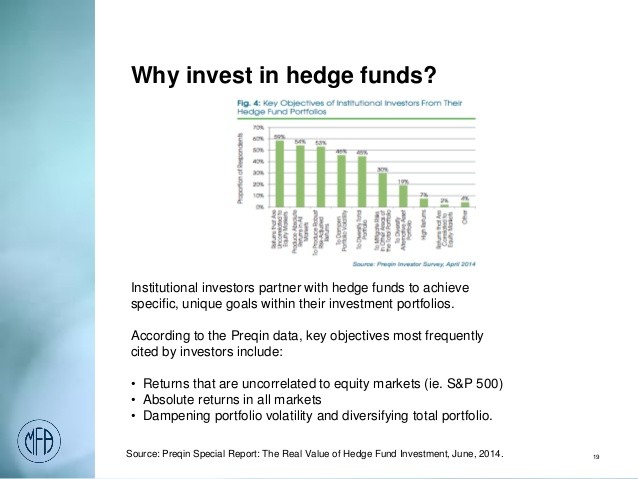Hedge Fund Investing 101
Post on: 18 Июль, 2015 No Comment

Want to enter the elite world of hedge fund investing? All you need is a lot of money or a lot of moxie. When it comes to deciding if you qualify as a private investor, hedge fund managers are pretty much left to their own devices.
“Hedge funds have to reasonably believe that you meet investing requirements, and funds are legally required to ask you if you have the money,” says David Mahaffey, a partner at Washington, D.C. law firm Sullivan & Worcester, who practices business law. Generally, hedge fund managers meet this obligation by making prospective clients fill out a lengthy questionnaire.
A typical worksheet would ask you to detail your holdings, including stocks, real estate, physical commodities and commodity contracts, swaps and futures. There are two basic categories of private investors: accredited investors, who need a net worth of more than $1 million; and qualified purchasers, who need to have $5 million in investments not including a primary residence or any property used for a business.
But actually becoming an accredited investor or qualified purchaser is something of a scout’s honor arrangement, because hedge fund managers aren’t required to ask you for much documentation backing up your questionnaire. You may need to provide a financial reference, such as your broker, but it’s unlikely that someone is going to comb through your tax returns.
Hedge fund managers are required to ask these questions because the U.S. Securities and Exchange Commission, the government agency charged with protecting individual investors, doesn’t scrutinize these private investing vehicles. Hedge funds can make many types of potentially risky investments, such as investing in derivatives or betting on currency moves. Leverage is a mainstay of these funds, often in much greater degrees than most individual investors are used to.
If you’re new to hedge funds, you should seek outside counsel to make sure you are investing in a solid fund. Last winter, the hedge fund industry lived through its greatest nightmare–a full-fledged blowup. Michael Berger. manager of Bermuda-based Manhattan Investment Fund. was shorting tech stocks throughout the 1999 rally and claiming huge returns. Then investors filed a lawsuit in January alleging that Berger had misstated his earnings by hundreds of millions of dollars. The fund had all the trappings of respectability, too, with oversight from Deloitte & Touche and a subsidiary of Ernst & Young. and a brokerage account at Bear, Stearns & Co. .
This story is quite atypical. Generally it is a good sign if a hedge fund holds its assets with a third-party broker such as Bear Stearns or ING Barings –two of the bigger hedge fund brokers. That usually makes it tougher for managers to run off with your money. And since the SEC is not watching your hedge fund, you want to make sure that a reliable auditor is reviewing your fund annually.
Another comforting feature: seeing a big-name law firm on the legal documents. Among the biggest firms working in the hedge fund industry are Schulte Roth & Zabel; Gardner, Carton & Douglas; and Seward & Kissel. Some of the firms most commonly found auditing hedge funds are Rothstein, Kass & Co. and Goldstein Golub Kessler. That’s in addition to the Big Five of Deloitte & Touche; Ernst & Young; PricewaterhouseCoopers; KPMG; and Arthur Andersen.

There are thousands of hedge funds, of course, so situations like that at Manhattan Investment Fund should not be the sole consideration when deciding whether to sink some of your hard-earned capital into one of these private investments. But keep in mind that the typical minimum hedge fund investment is between $500,000 and $1 million. Most of the big successful funds have a much higher minimum initial investment.
Managers are legally allowed to accept investments from up to 35 people who aren’t accredited investors. But the only way a nonaccredited investor might get into a hedge fund is if he or she knows the manager personally, says Jim Gillies, chief information officer at HedgeFund.net. a free industry Web site for accredited investors and Forbes Best of the Web special selection.
If you aren’t an accredited investor, it may be tough for you to hear about a particular hedge fund in the first place. That’s because the SEC restricts hedge fund managers from any form of advertising, including publicly accessible Web sites.
So here’s how to determine if you make the grade. To become an accredited investor, you and your spouse need a combined net worth of $1 million–not too high a barrier, considering this can include the estimated value of your home. You’ll also need an individual income of $200,000 or a joint income of $300,000. Many people worry that these requirements don’t go far enough, but the figures, which were set in 1982, haven’t been adjusted since. “There are a lot of unsophisticated millionaires out there,” says Gillies.
Some hedge funds are required to set the bar a little higher. To invest in a fund with more than 99 shareholders, you need to be in the wealthier qualified purchaser category.














